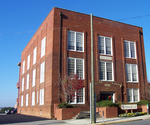Capture of Columbia
1865 in South CarolinaArson in South CarolinaBattles of the Western Theater of the American Civil WarCampaign of the CarolinasFebruary 1865 events ... and 4 more
History of Columbia, South CarolinaRichland County, South CarolinaSouth Carolina in the American Civil WarUnion victories of the American Civil War

The capture of Columbia occurred February 17–18, 1865, during the Carolinas Campaign of the American Civil War. The state capital of Columbia, South Carolina, was captured by Union forces under Maj. Gen. William T. Sherman. Much of the city was burned, although it is not clear which side caused the fires.
Excerpt from the Wikipedia article Capture of Columbia (License: CC BY-SA 3.0, Authors, Images).Capture of Columbia
Gervais Street, Columbia The Vista
Geographical coordinates (GPS) Address Nearby Places Show on map
Geographical coordinates (GPS)
| Latitude | Longitude |
|---|---|
| N 34.0007 ° | E -81.0348 ° |
Address
J. Marion Sims Memorial
Gervais Street
29201 Columbia, The Vista
South Carolina, United States
Open on Google Maps








